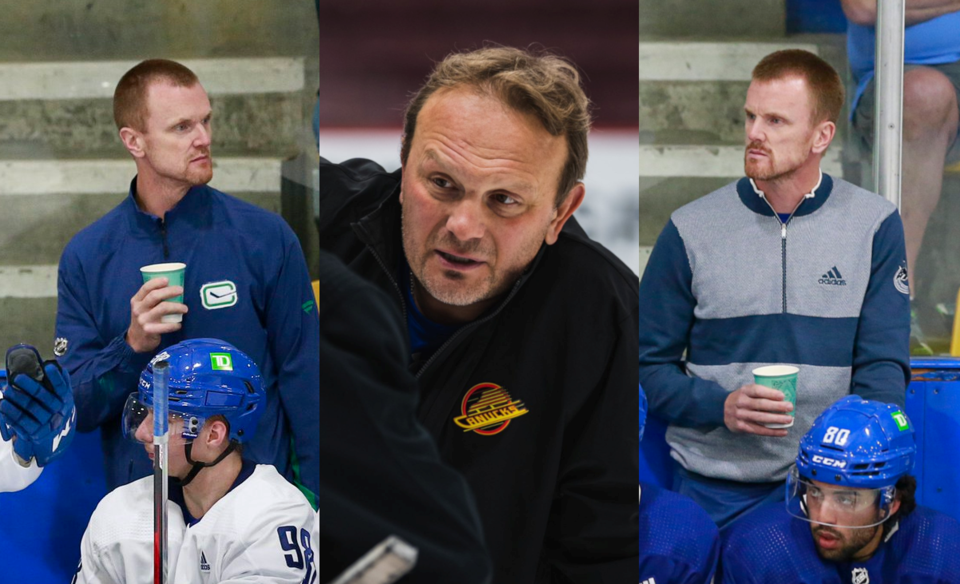In a season full of things that went wrong for the Â鶹´«Ă˝Ół»Canucks, the power play was one of the few things that went right.
Sure, the Canucks had an issue with giving up shorthanded goals — no other team gave up more than their 14 shorthanded goals against — but they were also just short of the top ten in power play goals with 62. Their 22.7% power play percentage was the seventh-best in franchise history.
Next season’s power play, however, will have a different look. That’s primarily because Bo Horvat, who played a key role in the bumper position, is gone. Horvat was second on the Canucks in power play goals with 11 despite being traded mid-season and also led the team in power play faceoff percentage with a whopping 65.4% success rate.
The other reason the power play will look different, however, is because the Canucks will have a new power play coach. Or, rather, coaches.
"Sergei Gonchar and the twins" will run the power play
Jason King headed up the power play for two season after Newell Brown was let go and survived the firing of two head coaches, Travis Green and Bruce Boudreau. He was fired after the 2022-23 season ended, however, and was to take over their power play.
The Canucks didn’t hire anyone to replace King, choosing to instead work with the coaching staff already on hand. Rick Tocchet revealed in that they’re going a very unorthodox route with their power play coaching.
“Sergei Gonchar and the twins [Daniel and Henrik Sedin], and I'll take a big chunk of it for now, and then we'll go from there,” said Tocchet when asked who will run the power play.
In other words, Tocchet is going to have three coaches run the power play — four including Tocchet himself — and none of those three coaches are currently full-time assistant coaches.
The Sedins are currently in the Canucks’ player development department, which meant spending a significant amount of time with the Abbotsford Canucks last season, working directly with the team’s prospects in the AHL. They were never behind the bench during Canucks games as assistant coaches.
Gonchar, meanwhile, is only a part-time coach with the Canucks. His official title is “defensive development coach” and , where his kids are still in school. During last season, he would spend two weeks with the Canucks, then head back to Dallas, where he would provide coaching to the players via video.
“When I’m at home watching a game, usually within 30 minutes after the game I have access to the video and I break down the clips,” said Gonchar to Postmedia’s Patrick Johnston. “So every single game, pretty much the next day, the guys have access to my comments.”
In other words, unlike in his career, Gonchar is a stay-at-home defenceman.
It’s an unusual arrangement but one that can work in a specialized development role. For a coach who is supposed to help run the power play, however, it seems less than ideal.
But Tocchet seems intent on making it work.
“[Gonchar] is still on that kind of part-time [arrangement] but I think I'm going to get more out of him in the sense of more days,” said Tocchet to MacIntyre. “If Sergei's on the road part-time, maybe road trips [when he’s away], can I get one of the twins to come? But they're all in. Sergei, even though he's at home half the time, he's still in contact, still calling players, still watching video, still sending video. He's just not there every day.”
Tocchet also wants the players to take more ownership of the power play.
“I'll be honest with you, I'm going to really rely on that core group of guys on the powerplay to come up with ideas,” he said to MacIntyre.
That means Pettersson, Quinn Hughes, J.T. Miller, Andrei Kuzmenko, and whoever replaces Horvat on the top unit — perhaps Brock Boeser — taking a more active role in coming up with power play schemes. This is something that already happens quite a bit, as coaching elite players is often more of a conversation than top-down dictation, but the players may have to take a bigger role if their power play coaches are constantly changing behind the bench.
Gonchar and the Sedins bring wealth of power play knowledge
It’s an odd plan with a lot of risks, but it could mean some major rewards if it works. Simply put, few know the ins and outs of the power play better than Gonchar and the Sedins.
Gonchar was an elite power play quarterback in his playing days. He’s 10th all-time among defencemen in career power play points and 11th all-time in power play goals.
As for the Sedins, Canucks fans are well aware of their power play prowess. They were constant innovators, seemingly coming back from every offseason with a new wrinkle to bewilder opposing penalty kills. The idea of them continuing to innovate on the power play as coaches is a tempting proposition.
There’s room for improvement on the Canucks’ power play as well.
While largely successful, the power play was not without its issues last season. There were the aforementioned shorthanded goals against, of course, but also the power play was inconsistent and streaky, and King never found a way to create scoring opportunities for Elias Pettersson, who had just six power play goals last season.
If Gonchar and the Sedins can help figure out ways to free up Pettersson to shoot the puck more on the power play and to replace Horvat’s scoring from the bumper, the Canucks could have one of the best power plays in the NHL.
The question is whether not having the same power play coach behind the bench on a game-to-game basis could lead to more inconsistency or an inability to make in-game adjustments.




